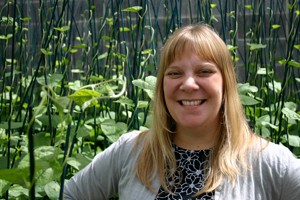
What s the Story, Morning Glory?
An undergraduate research experience catapulted Regina Baucom into the world of science. In a biology honors program at the University of Tennessee, she created a research project that looked at the impact of logging on genetic diversity in Great Smoky Mountain sugar maples (
Acer saccharum
).
I guess I started out thinking I wanted to go into nonprofit organizations, working with environmental groups, Baucom says. But then I started to think about the impact of humans on evolutionary trajectories of species. How can humans impact the natural world in ways were not really thinking about?
Now an assistant professor in the
Department of Biological Sciences
at the University of Cincinnati, Baucom continues to ask these questions.
Her current research focuses on the tolerance and resistance of morning glories (
Ipomoea purpurea
) to Roundup, a common herbicide used in the U.S. She published on the topic in
.
She began studying the evolution of tolerance as a doctoral student at University of Georgia, where she received her PhD in genetics in 2006. A postdoctoral fellowship at UGA gave her the opportunity to help annotate the maize genome and look at genetic complexities of the plant. Her work on the maize genome was recently published in both Science and PLoS Genetics.
Im focusing on how humans can cause selection in agricultural systems, she says. In general, transgenic technology is helping food production but because of its overuse, were having an increase in the evolution of weed resistance to herbicides.

Morning glories.
These herbicide-resistant weedscalled superweeds in a recent New York Times articleare forcing farmers to combat them with more toxic herbicides, which can lead to increased food prices, farm costs and pollution of land and water.
Baucoms current goal is to identify the genetic basis of herbicide resistance in morning glories and determine if different populations adapt to the herbicide in the same manner.
She is in the process of setting up her lab, growing morning glories in the biology departments greenhouse, and taking advantage of the
Cincinnati Center for Field Studies
(CCFS). The field station in Miami Whitewater Forest provides a living lab for students, teachers and scientists to conduct hands-on research.
Im excited to work at the field station, Baucom says. Its one of the main reasons I was drawn to UC.
Baucom and her husbanda genome informatics postdoctoral fellow who is working for the National Science Foundations iPlant Collaborative, a $50-million cyberinfrastructure collaborative for the plant scienceshave one son and are expecting a daughter.
Read more about the Department of Biological Sciences:
UC researcher finds that when it comes to hooking up with the opposite sex, genital complexities do matter.
Gene Leader: Alumna Maps a Career in Genetic Counseling
Biology alumna Judith Benkendorf has dedicated nearly 30 years to the field of genetic counseling.
UC Scientists Determine That Ancient Maya Practiced Forest Conservation 3,000 Years Ago
Researchers from the University of Cincinnati find the forest and water conservation practices of the ancient Maya hold lessons for the future ours.
UC to Create 'Living Lab' in Park
The agreement with the Hamilton County Park District provides a Cincinnati Center for Field Studies a living lab for students, teachers and scientists to conduct hands-on research in archeology, geology and environmental studies and more.
Related Stories
Information Security Roadshow spreads awareness
May 3, 2024
The University of Cincinnati's Office of Information Security launched a series of 18 in-person sessions from January to April 2024, drawing nearly 350 attendees from the staff of various UC colleges and units. The Information Security Roadshow series aimed to equip the audience with knowledge on prevailing cyber threats, prevention strategies, how to report incidents and resources to stay informed and secure.
UC alum makes her mark in research, service
May 3, 2024
In 1960, as a young and eager statistician, Joan Reisch graduated from UC’s College of Arts and Sciences, and pursued a career in Texas at the Southwestern Medical Center where she’s held numerous roles as both faculty and staff. This year, Reisch was recognized for her career accomplishments and contributions with the Philanthropist of the Year Award by UC’s Alumni Association. This award is given to an alumnus who has been highly engaged in philanthropic activities with A&S, or has made a significant impact on the college.
UC launches new study of 'forever chemicals' in drinking water
May 2, 2024
The University of Cincinnati is launching a new investigation at its groundwater observatory to examine the ways toxins from distant sources get into drinking water.
